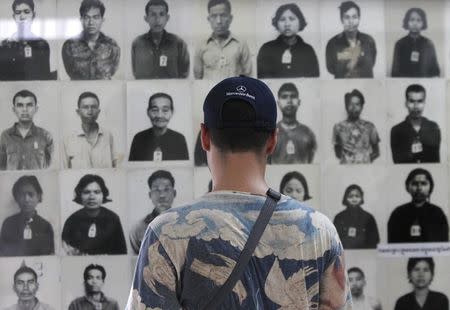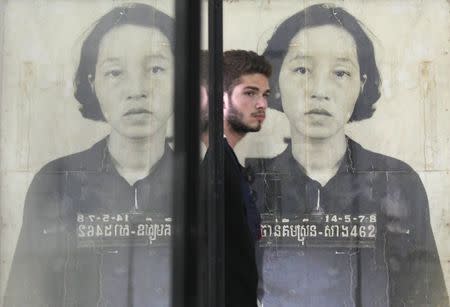U.N.-Cambodia tribunal charges two more ex-Khmer Rouge cadres
By Prak Chan Thul PHNOM PENH (Reuters) - A U.N.-backed war crimes tribunal in Cambodia charged two former cadres of the 1970s Khmer Rouge regime with crimes against humanity on Tuesday over their alleged roles in the deaths of an estimated 1.8 million people. The charges were brought against Im Chaem, a Buddhist nun in her 60s suspected of running a forced labour camp, and Meas Muth, a former navy chief in his 80s who allegedly sent detainees to a torture centre where at least 14,000 people died. Neither suspect has yet to be arrested. The announcement marked a rare sign of progress by a court plagued by infighting, political interference, resignations and funding shortages since it was set up nearly a decade ago to bring to justice "those most responsible" for the deaths of a fifth of the population from 1975-1979. It has so far delivered guilty verdicts for crimes against humanity to only three defendants, two of whom - "Brother Number Two" Nuon Chea and former President Khieu Samphan - remain on trial in a separate case. One defendant died before a ruling was made and another was declared unfit for trial with Alzheimer's disease. The latest charges cover breaches of Cambodian and international laws and conventions, including murder, extermination, slavery and political and ethnic persecution as well as "other inhumane acts". Victims of the "Killing Fields" era perished from torture, disease, execution, starvation and exhaustion in the late Pol Pot's pursuit of a peasant utopia. Virtually every Cambodian alive today lost relatives. Many Khmer Rouge remnants are integrated in society, some holding positions in the government, which has been accused of trying to stifle the court's progress to ensure prominent figures are untouched. Prime Minister Hun Sen, a former Khmer Rouge soldier who said he defected, last week reiterated his warning of a descent into conflict if the tribunal widens its net. "If war happened, how many people would be killed," he said in a speech. "We've already had that experience." Optimism the foreign-funded million court could bring comprehensive justice has been dulled by complexity, painstakingly slow proceedings and the age and health of suspects, several of whom have died. Tribunal spokesman Lars Olsen said decisions on how far the cases will go, or whether the charges would be dismissed, would come next year and the pair should be presumed innocent until proved guilty. "The charging of these two persons is not an indication on what will become the outcome of the investigation," he said. (Writing by Martin Petty; Editing by Nick Macfie)

 Yahoo News
Yahoo News 


